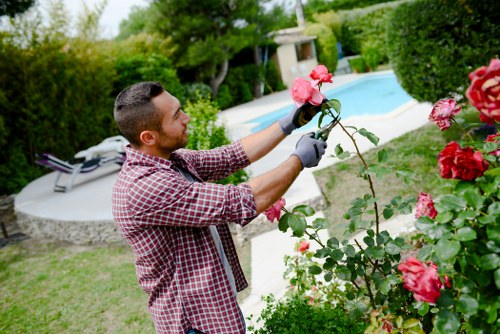Garden Fence Installation in Richmond: Enhancing Your Outdoor Space

Installing a garden fence in Richmond is a fantastic way to enhance the beauty, privacy, and security of your outdoor space. Whether you're looking to keep pets and children safe, define property boundaries, or simply add a decorative touch, a well-installed fence can make a significant difference.
Richmond offers a variety of styles and materials suitable for garden fences, allowing homeowners to choose the perfect fit for their landscape and personal taste. From classic wooden fences to modern metal and vinyl options, there's something for every garden.
Before you begin your garden fence installation, it's essential to consider several factors, including local regulations, the purpose of the fence, and the specific needs of your property. This guide will walk you through the key steps and considerations to ensure a successful fence installation in Richmond.

Choosing the Right Fence Material
One of the first decisions you'll make when planning your garden fence installation is selecting the right material. The material you choose will impact the fence's durability, maintenance requirements, and overall appearance.
Wood: Wood is a popular choice for garden fences due to its natural beauty and versatility. It can be painted or stained to match your garden's aesthetics and offers a traditional look that's hard to replicate with other materials.
Vinyl: Vinyl fences are low-maintenance and resistant to weathering, making them a great option for those who prefer minimal upkeep. They come in various styles and colors, allowing for customization without the need for painting or staining.

Understanding Local Regulations
Before proceeding with your fence installation, it's crucial to understand Richmond's local regulations and zoning laws. These rules govern aspects such as fence height, placement, and materials to ensure that your installation complies with community standards.
Typically, residential fences in Richmond are restricted to a certain height limit, often around 6 feet, but this can vary based on your property's location and the type of fence. Additionally, there may be guidelines regarding the distance from property lines and streets.
Consulting with your local Richmond building authority or a professional fence installer can help you navigate these regulations and avoid potential issues during the installation process.

Planning Your Fence Layout
Proper planning is essential for a successful garden fence installation. Start by measuring the area where you intend to install the fence to determine the amount of materials you'll need. Consider the fence's purpose—whether it's for privacy, decoration, or security—as this will influence the design and height.
Mark the fence line accurately, ensuring it's straight and aligned with existing property boundaries. If you're installing a longer fence, dividing the project into manageable sections can help streamline the process and ensure consistency throughout.
It's also helpful to plan for any gates or special features, such as decorative panels or integrated lighting, which can enhance the functionality and aesthetic appeal of your fence.

Hiring a Professional Installer
While DIY fence installation is possible, hiring a professional installer in Richmond can save you time and ensure a high-quality result. Professionals have the expertise and tools needed to handle various fence materials and navigate any challenges that may arise during the installation process.
When selecting a fence installation company, consider their reputation, experience, and customer reviews. A reliable installer will provide a clear estimate, communicate effectively, and adhere to the agreed-upon timeline.
Additionally, professional installers are well-versed in local regulations and can ensure that your fence complies with all necessary codes, reducing the risk of future complications.
Maintaining Your Garden Fence
Once your garden fence in Richmond is installed, regular maintenance is key to prolonging its lifespan and maintaining its appearance. The type of maintenance required will depend on the material of your fence.
- Wood: Wooden fences may require periodic staining or painting to protect against moisture and pests. Inspect the fence regularly for signs of rot or damage and address issues promptly.
- Vinyl: Vinyl fences are relatively low-maintenance but should still be cleaned periodically to remove dirt and debris. Check for any cracks or warping and make necessary repairs.
- Metal: Metal fences may need to be treated for rust and painted to prevent corrosion. Ensure that any loose or damaged sections are fixed to maintain structural integrity.
Proper maintenance not only keeps your fence looking great but also ensures it continues to serve its intended purpose effectively.
Benefits of a Garden Fence
Installing a garden fence offers numerous benefits that enhance both the functionality and aesthetics of your outdoor space:
- Privacy: A fence provides a sense of seclusion, allowing you to enjoy your garden without prying eyes.
- Security: Fences act as a deterrent to unwanted visitors and can help keep pets and children safe within your property.
- Property Boundary: Clearly defines property lines, reducing disputes with neighbors and ensuring your space remains distinct.
- Aesthetic Appeal: Adds character and style to your garden, complementing the overall landscape design.
- Noise Reduction: Helps to dampen external noises, creating a more peaceful environment.
These benefits make a garden fence a valuable addition to any Richmond home, enhancing both the quality of life and property value.
Cost Considerations
The cost of garden fence installation in Richmond can vary widely based on several factors, including the material, size of the area, and complexity of the design. Here's a breakdown of potential costs:
- Material: Wood is often the most affordable option, while vinyl and metal can be more expensive but offer longer durability.
- Size: The total length of the fence will significantly impact the overall cost. Larger areas require more materials and labor.
- Design Complexity: Intricate designs with decorative elements or unique features can increase installation costs.
- Labor: Hiring a professional installer will add to the expense but ensures a quality and compliant installation.
It's advisable to obtain multiple quotes from reputable installers in Richmond to compare prices and services. Investing in a quality fence upfront can save you money in the long run by reducing maintenance and replacement costs.
Environmental Considerations
When selecting materials for your garden fence installation, consider the environmental impact. Opting for sustainable materials like treated wood from responsibly managed forests or recycled metal can reduce your ecological footprint.
Additionally, properly maintaining your fence ensures it lasts longer, reducing the need for frequent replacements and minimizing waste. Implementing eco-friendly practices during installation, such as recycling old materials, can further enhance the environmental benefits.
10-15 Nearby Areas to Richmond for Garden Fence Installation
Richmond is surrounded by several charming areas that also benefit from professional garden fence installation services. Here are some of the closest areas to Richmond where you can find expert installers:
- Charlestown: Just a short drive from Richmond, Charlestown offers a mix of residential and commercial properties ideal for garden fencing.
- Glen Allen: Known for its beautiful homes and lush gardens, Glen Allen is a prime location for customized fence installations.
- Hampton A historic area with unique architectural styles, Hampton homeowners often seek fences that complement the traditional aesthetics.
- Petersburg: Close to Richmond, Petersburg residents can take advantage of a variety of fencing materials and designs.
- Short Pump: A bustling suburb with modern homes, Short Pump residents may prefer sleek and contemporary fence styles.
- Hopewell: Known for its scenic landscapes, Hopewell is perfect for natural wood fences that blend with the environment.
- Bon Air: With its quiet neighborhoods, Bon Air homeowners often prioritize privacy fences for their gardens.
- Midlothian: A family-friendly area where safety and security fences are highly sought after.
- Chesterfield: Offering a range of fencing options, Chesterfield caters to diverse architectural preferences.
- Mechanicsville: Residents enjoy durable and low-maintenance fences suitable for the area's climate.
- Dinwiddie: A rural area where sturdy metal and wood fences are popular for larger properties.
- Henrico: Close to Richmond, Henrico provides numerous fencing solutions for both urban and suburban settings.
- Mechanicsville: Offering a blend of rural and suburban homes, catering to various fencing needs.
- Bon Air: With its serene environment, Bon Air is ideal for elegant and decorative fencing options.
- Ashland: Known for its community spirit, Ashland homeowners often invest in quality fences to enhance their properties.
- St. Paul: A peaceful neighborhood where functional and attractive fences are in high demand.
These nearby areas expand the reach of Richmond's garden fence installation services, ensuring that residents across the region can enjoy the benefits of a well-installed fence.
Choosing the Right Style for Your Garden Fence
With a variety of styles available, selecting the right garden fence involves considering both functional and aesthetic aspects. Here are some popular styles to consider:
- Privacy Fences: Tall and solid, privacy fences prevent outsiders from seeing into your garden, creating a secluded space.
- Picket Fences: Featuring evenly spaced vertical boards, picket fences offer a charming and classic look, perfect for decorative purposes.
- Ranch Fences: Simple and understated, ranch fences are ideal for defining property lines without drawing too much attention.
- Ornamental Metal Fences: Adding elegance and durability, metal fences come in various designs, including scrollwork and lattice patterns.
- Vinyl Fences: Versatile and low-maintenance, vinyl fences can mimic the appearance of wood while offering superior weather resistance.
- Hedge Fences: Living fences made from shrubs or hedges provide a natural look and can be a sustainable fencing option.
Choosing the right style will not only complement your garden's design but also meet your specific needs, whether it's privacy, security, or aesthetic appeal.
Installation Process
The garden fence installation process in Richmond typically involves several steps to ensure a sturdy and long-lasting result:
- Planning and Measurement: Begin by measuring the area where the fence will be installed and determining the number of materials needed.
- Permitting: Obtain any necessary permits from local authorities to comply with regulations.
- Marking the Layout: Use stakes and string to mark the fence line, ensuring it's straight and aligned.
- Setting Posts: Dig holes for fence posts, ensuring they are deep enough for stability. Insert the posts and secure them with concrete.
- Installing Rails: Attach horizontal rails to the posts to provide support for the fence panels or boards.
- Adding Fencing Panels or Boards: Install the fence panels or vertical boards, ensuring they are evenly spaced and securely attached.
- Finishing Touches: Add any additional features such as gates, decorative elements, or protective coatings.
Professional installers follow these steps meticulously to guarantee a high-quality fence that meets all functional and aesthetic requirements.
Common Challenges and Solutions
Garden fence installation can come with challenges, especially in areas with specific terrain or climate conditions. Here are some common issues and how to address them:
- Uneven Ground: Slopes or uneven terrain can make fence installation tricky. Solutions include using adjustable fence posts or incorporating terracing techniques.
- Poor Soil Conditions: Rocky or sandy soils may require deeper post holes or the use of concrete for added stability.
- Weather Extremes: Richmond's weather can impact fence materials. Choosing weather-resistant materials and applying protective treatments can mitigate damage from rain, sun, and wind.
- Obstructions: Trees, rocks, or existing structures can interfere with fence placement. Proper planning and possible removal or relocation of obstructions may be necessary.
- Neighbor Disputes: Clear communication with neighbors about fence placement and design can prevent conflicts and ensure a harmonious installation.
Addressing these challenges proactively ensures a smoother installation process and a durable, attractive fence.
Cost of Garden Fence Installation in Richmond
The cost of installing a garden fence in Richmond varies depending on several factors. Below is an overview of the key components that influence pricing:
- Material Costs: Different materials come at different price points. Wood is generally more affordable, while vinyl and metal tend to be pricier but offer greater durability.
- Labor Costs: Hiring professional installers will increase the overall cost but ensures quality workmanship and adherence to local regulations.
- Fence Height and Length: Taller and longer fences require more materials and labor, directly impacting the total cost.
- Design Complexity: Decorative elements, custom designs, or gates add to the expense due to the additional labor and materials required.
- Site Preparation: Issues like uneven terrain or the need to remove existing fences can increase installation costs.
On average, homeowners in Richmond can expect to spend anywhere from $15 to $45 per linear foot for garden fence installation, depending on the factors mentioned above. Obtaining multiple quotes from reputable installers can help you find the best value for your budget.
Choosing the Right Installer
Selecting a reputable and experienced fence installer in Richmond is crucial for a successful project. Here are some tips to help you make the right choice:
- Check Credentials: Ensure the installer is licensed, insured, and has the necessary certifications to operate in Richmond.
- Review Past Work: Look at portfolios or ask for references to assess the quality and style of their previous installations.
- Get Multiple Quotes: Obtain estimates from several installers to compare pricing and services offered.
- Read Reviews: Online reviews and testimonials can provide insight into the installer's reliability and customer satisfaction.
- Ask About Warranties: A good installer should offer warranties on both materials and workmanship, giving you peace of mind.
- Communication: Choose an installer who communicates clearly and is responsive to your questions and concerns.
Taking the time to research and select the right professional will ensure your garden fence installation meets your expectations and stands the test of time.
Maintenance Tips for Longevity
To ensure your garden fence remains in excellent condition for years to come, follow these maintenance tips:
- Regular Cleaning: Remove dirt, debris, and mildew using appropriate cleaning methods based on the fence material.
- Inspect for Damage: Periodically check for loose boards, rust, or other signs of wear and address issues promptly.
- Protective Treatments: Apply sealants, paints, or stains to wood fences to prevent moisture damage and extend their lifespan.
- Prevent Overgrowth: Trim any vegetation that may cause damage or interfere with the fence structure.
- Avoid Harsh Chemicals: Use cleaning agents that are suitable for your fence material to prevent unnecessary damage.
Consistent maintenance not only preserves the appearance of your fence but also ensures it continues to function effectively, providing security and privacy as intended.
Environmental Impact of Fence Materials
Considering the environmental impact of your fence materials is increasingly important. Here are some eco-friendly options and practices:
- Sustainably Sourced Wood: Choose wood from certified sustainable forests to minimize deforestation and habitat destruction.
- Recycled Materials: Opt for fences made from recycled metals or plastics, reducing waste and conserving resources.
- Natural Finishes: Use non-toxic stains and paints to reduce the release of harmful chemicals into the environment.
- Living Fences: Incorporate plants and shrubs into your fencing design for a natural and renewable option.
By selecting environmentally friendly materials and practices, you contribute to a healthier planet while enjoying the benefits of a beautiful garden fence.
Enhancing Curb Appeal with a New Fence
A well-chosen garden fence can significantly boost your home's curb appeal, making it more attractive to visitors and potential buyers. Here are some ways a new fence can enhance your property:
- Defined Boundaries: Clearly delineates your property, providing a neat and organized appearance.
- Style Matching: Complements your home's architectural style, creating a cohesive and harmonious look.
- Color Coordination: Selecting colors that match or accentuate your home's exterior can make your fence stand out or blend in beautifully.
- Decorative Elements: Incorporating decorative panels, lattice work, or lighting can add visual interest and sophistication.
- Landscape Integration: Aligning your fence with existing garden features enhances the overall landscape design.
Investing in a stylish and functional fence is a smart way to improve your property's overall appearance and value.
DIY vs. Professional Installation
When deciding between DIY and professional fence installation in Richmond, consider the following factors:
- Skill Level: DIY installation requires knowledge and experience with tools and construction. If you're not confident in your abilities, a professional may be a better choice.
- Time Commitment: Installing a fence yourself can be time-consuming, especially for larger projects. Professionals can complete the job more efficiently.
- Quality: Professionals ensure that the fence is installed correctly, adhering to all standards and regulations, which can prevent future issues.
- Cost: While DIY can save on labor costs, you may incur additional expenses for tools and materials. Professionals may offer better long-term value through quality installation.
- Permits and Regulations: Navigating local regulations and obtaining necessary permits can be easier with the help of experienced installers.
Ultimately, the choice depends on your comfort level, budget, and the complexity of the project. For many homeowners in Richmond, hiring a professional offers peace of mind and a high-quality result.
Financing Your Fence Installation
Garden fence installation can be a significant investment, but there are several financing options available to help manage the costs:
- Home Equity Loans: Borrowing against your home's equity can provide a low-interest option for financing your fence project.
- Personal Loans: Unsecured personal loans offer flexibility without the need for collateral, though interest rates may be higher.
- Credit Cards: Using a credit card for smaller projects can be convenient, but be mindful of interest rates and repayment terms.
- Financing Plans: Some fence installation companies offer financing options, allowing you to pay in installments over time.
- Government Grants: Occasionally, local governments provide grants or incentives for home improvement projects, including fencing.
Exploring these options can help you find a financing solution that fits your financial situation and enables you to enhance your garden without undue financial strain.
Conclusion
Garden fence installation in Richmond is a valuable investment that enhances your property's aesthetics, privacy, and security. By carefully selecting the right materials, understanding local regulations, and choosing a reputable installer, you can ensure a successful and lasting fence installation.
Whether you're aiming to create a private sanctuary, define your property boundaries, or boost your home's curb appeal, a well-installed garden fence can make a significant difference. With proper planning, maintenance, and consideration of environmental factors, your new fence will serve you well for years to come.
Take the time to research and plan your garden fence project, and don't hesitate to seek professional guidance to achieve the best results. Your Richmond garden deserves the best, and a quality fence installation is a step towards creating an outdoor space you'll love.
Frequently Asked Questions
1. What is the average cost of garden fence installation in Richmond?
The cost varies based on materials, size, and design complexity, but on average, homeowners can expect to spend between $15 to $45 per linear foot.
2. How long does it take to install a garden fence?
Installation time depends on the fence size and complexity. Generally, a professional team can complete a standard residential fence in a few days.
3. Do I need a permit for garden fence installation in Richmond?
Yes, most residential fence installations in Richmond require permits. It's essential to check with local authorities or your installer to ensure compliance.
4. What maintenance does a wooden garden fence require?
Wooden fences may need periodic staining or painting to protect against moisture and pests, along with regular inspections for damage or rot.
5. Can I install a fence on a sloped property?
Yes, but it requires careful planning and possibly the use of adjustable fence posts or terracing techniques to ensure stability and alignment.